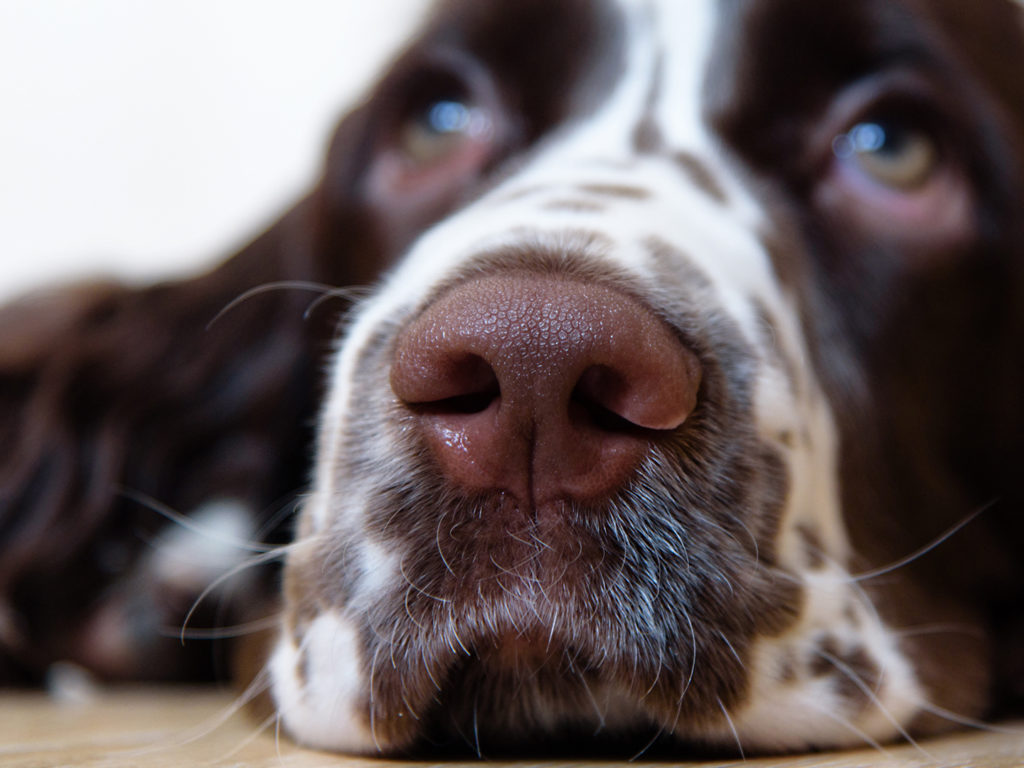Does The Nose Know?—The Truths And Myths Of Canine Nasal Health

It is a common belief that a wet nose is the sign of a healthy dog and that a dry nose indicates illness.
But this is not necessarily true for every canine companion, according to Dr. Erin Ray, a clinical assistant professor at the Texas A&M College of Veterinary Medicine & Biomedical Sciences.
“This historic belief is not true across the board,” Ray said. “There are many factors that can cause a wet or dry nose in dogs.”
A wet nose can indicate that a dog is well-hydrated or simply has a tendency to lick its nose often, which is one way a dog enhances its sense of smell. However, wet noses can also be caused by a runny nose or respiratory infection; wetness caused by heavy discharge, in particular, can indicate the need for medical care.
“Alternatively, a dog with a dry nose may live in a drier/warmer climate or just naturally have a drier nose,” Ray said. “Usually, a dry nose on its own is not concerning unless the nose appears cracked, painful, or there is a dramatic change in its appearance, such as a change in color or going from bumpy to smooth.”
Another issue to watch out for is sunburn, which is more common in dogs with lighter-colored noses.
“It is best for dogs to avoid being outside in the heat of the day for extended periods of time, especially during summer,” Ray said. “There are some sunscreens you can apply in a thin layer to the top of the nose, but because sunscreens can also be toxic, it’s best for an owner to reach out to their veterinarian to determine the safest choice.”
If a dog’s nose is normally wet but becomes dry, or vice versa, a trip to the veterinarian may be warranted. Likewise, any cuts or other irregularities on the nose should be evaluated by a veterinarian to avoid infection and rule out any serious causes.
In general, Ray recommends that owners evaluate their dog as a whole and try to avoid making health assumptions based on the wetness of their pet’s nose alone.
Even though a wet nose is not always useful as an indicator of health, it does enhance a dog’s sense of smell when compared to a dry nose.
“The inside of the nose itself typically works a bit better if it’s moist or hydrated, just like the rest of the respiratory system,” Ray said.
If a dog usually has a dry nose, applying a thin layer of petroleum jelly or the contents of a vitamin E capsule to their nose can help provide extra moisture. In addition, making sure your dog always has access to clean, fresh water can help make sure dehydration is not a factor.
Just as every dog’s nose print is unique, every dog has a unique set of factors affecting the health of its nose. If you have any questions about your dog’s overall condition, a veterinarian can help you sniff out the truth.
Pet Talk is a service of the College of Veterinary Medicine & Biomedical Sciences, Texas A&M University. Stories can be viewed on the web at vetmed.tamu.edu/news/pet-talk. Suggestions for future topics may be directed to editor@cvm.tamu.edu.


